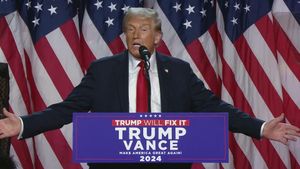A New York judge ruled Monday against President-elect Donald Trump's bid to have his conviction for covering up hush money payments to a porn star dismissed on grounds of presidential immunity. This significant ruling, delivered by Judge Juan Merchan, stated the Supreme Court's decision granting presidents sweeping immunity for official acts does not apply here, as the testimony presented during the trial was related "entirely to unofficial conduct entitled to no immunity protections," as reported by CNN.
This ruling has raised the stakes for Trump, raising the prospect of him becoming the first president to assume office with a felony conviction, pending his appeal against the jury's verdict. Trump has consistently opposed the criminal processes initiated against him, which stemmed from payments made to secure silence over alleged misconduct during his 2016 presidential campaign.
With the case's future uncertain, Trump's legal strategy has included attempts to move the trial to federal court, where he could potentially have more control over its outcome. His team has been firm, citing the landmark July ruling by the Supreme Court, which allowed for significant presidential immunity concerning official acts. They are pushing for dismissal of the case, arguing it falls under the protection of this ruling.
Judge Merchan's ruling directly addressed Trump's motion: "Defendant’s motion to dismiss the indictment and vacate the jury verdict… is denied." His firm stance reflects the broader sentiments within the legal community about the case's grounds.
The judge had previously postponed Trump's sentencing indefinitely following his win on November 5, stoking speculation about how the legal proceedings might interplay with his political future. Trump's legal team has been vocal about their desire for the case to be expedited, which some speculate is to allow him to assert greater control over the situation once he retakes the presidential office.
Prosecutors, on the other hand, maintained their position against Trump’s request to dismiss the case, explaining their stance as necessary to preserve the integrity of the office of the presidency. They asserted the notion of presidential immunity as articulated does not encompass the conduct involved with hush money payments and alleged cover-ups during the 2016 presidential campaign.
Interestingly, the prosecution's office did address concerns about potential interference with Trump's ability to govern, stating, "Multiple accommodations well short of dismissal… would satisfy [the objective], including a stay of proceedings during his term in office." This statement hints at the balancing act they are attempting to strike between accountability and accommodating the unique circumstances of Trump’s dual role as candidate and president.
Throughout the proceedings, Trump has painted himself as the victim of political machinations, claiming the charges against him are unjust attempts to thwart his return to power. His legal representatives have launched various challenges, claiming juror misconduct and other technical issues, which they hope will cast doubt on the legitimacy of the trial's outcome.
Meanwhile, last month Trump's lawyers reached out to New York Attorney General Letitia James, asking her to quash civil fraud judgments against him, which involved hefty penalties of $464 million. This tactic has been framed as potentially beneficial for the country, but was denied by Deputy Solicitor General Judith Vale, underscoring the legal hurdles Trump continues to face on multiple fronts as he prepares for his anticipated return to the White House.
This present scenario serves as a magnifying glass for Trump's multi-layered legal battles, as he appears determined to not only contest the criminal case but also navigate through civil liabilities. Whether his strategy pays off and whether he can maintain his political ambitions amid these legal challenges remains to be seen, reflecting one of the most unprecedented chapters in American political history.



